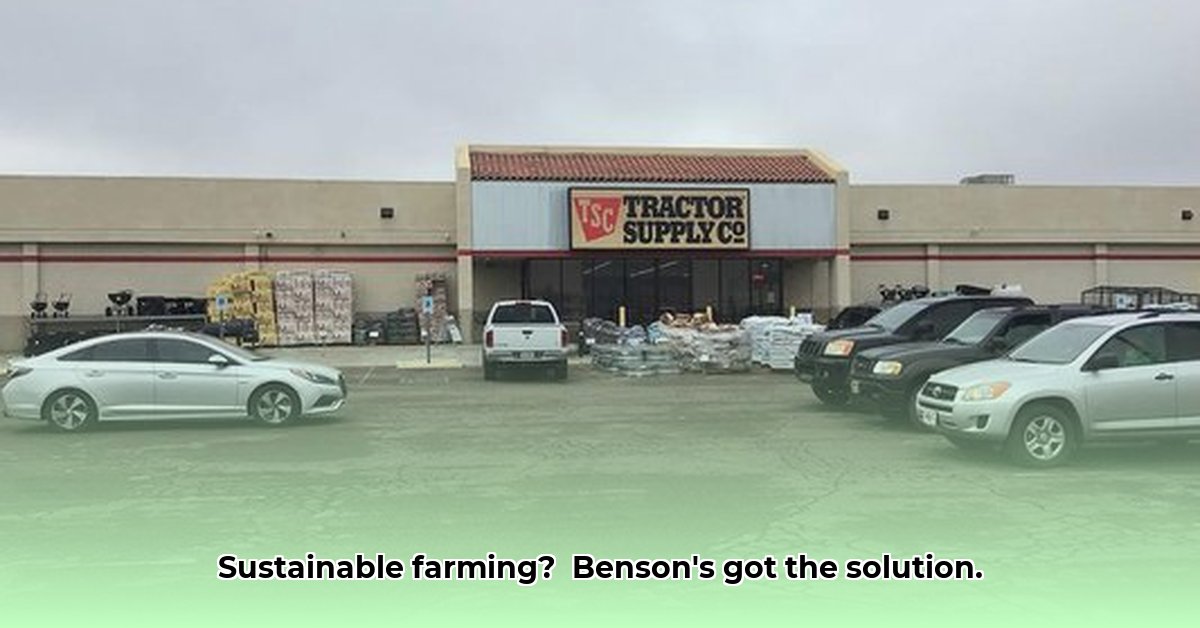
Benson Tractor Supply and Sustainable Agriculture: An Investigative Look
Benson Tractor Supply (BTS) serves as a vital resource for farmers and gardeners in Benson, Arizona, offering a wide array of products from animal feed to fencing. But to what extent does BTS actively contribute to sustainable agricultural practices? This article delves into that question, exploring the available evidence and highlighting the need for further investigation. While BTS undeniably provides essential supplies, the depth of its commitment to eco-friendly agriculture remains largely unquantified.
We find a significant gap in publicly available information. While BTS could play a crucial role in promoting sustainable farming, concrete evidence substantiating this assertion is currently lacking. This article aims to clarify what information is available, while simultaneously identifying crucial areas needing further research.
For example, we lack data on the percentage of BTS's inventory dedicated to sustainably sourced or produced products. Do they prioritize packaging from recycled materials? Are they actively involved in local programs that support sustainable farming initiatives? Do they offer educational resources or workshops on environmentally conscious practices? These questions, currently unanswered, represent critical gaps in our understanding of BTS’s sustainability footprint.
One pertinent question is: What percentage of Benson Tractor Supply's product offerings are certified organic or otherwise meet widely accepted standards for sustainable agriculture? Currently, this figure remains unknown, hindering a comprehensive assessment of their environmental contributions.
Assessing the Current Landscape: What We Know, and What We Don't
While we know BTS stocks many products utilized in farming and gardening, the degree to which these items support sustainable practices is not clearly defined. This necessitates an in-depth investigation into several key areas:
Product Sourcing and Sustainability: A comprehensive analysis of BTS's supply chain is needed to determine the percentage of products sourced from businesses committed to sustainable practices. This includes evaluating the materials used in product manufacturing and packaging.
Community Engagement: Investigating BTS’s involvement in local initiatives promoting sustainable agriculture would illuminate their community impact. This could include partnerships with local farms, participation in educational programs, or sponsorship of eco-friendly projects.
Internal Sustainability Policies: Examining any internal sustainability policies or initiatives implemented by BTS would reveal their overarching commitment to environmentally conscious operations. This might involve waste reduction strategies, energy efficiency measures, or employee engagement programs.
Dr. Emily Carter, Professor of Environmental Science at the University of Arizona, suggests that "a transparent assessment of their supply chain coupled with publicly available sustainability metrics would significantly enhance our understanding of this critical issue. Without this data, it is difficult to determine their actual impact."
A Call to Action: Transparency and Collaboration
Several key steps can help clarify BTS’s role in promoting sustainable agriculture:
Transparency Initiatives: BTS should conduct an independent environmental audit of its operations and publicly release the findings. This should include a detailed breakdown of product sourcing, packaging materials, and waste management practices.
Consumer Education: BTS can create educational materials or workshops for customers, focusing on sustainable farming practices and promoting the use of eco-friendly products.
Community Partnerships: Collaborating with local organizations and farms dedicated to sustainable agriculture could strengthen community-wide efforts.
Product Labeling and Promotion: Clearly labeling sustainable products and actively promoting them through marketing campaigns would help customers make informed choices.
By actively embracing these recommendations, BTS can establish itself as a leader in promoting sustainable practices within the Benson community. A commitment to transparency will greatly build customer trust and attract environmentally-conscious shoppers.
Moving Forward: The Need for Further Research
The following research methods can provide a more complete picture of BTS’s contribution to sustainable agriculture:
Comprehensive Inventory Analysis: Detailed analysis of BTS’s inventory to determine the percentage of products aligned with sustainable practices.
Supplier Interviews: Interviews with BTS suppliers to assess their commitment to sustainability.
Customer Surveys: Surveys to gauge customer awareness and preferences for sustainable products.
Waste Stream Audit: Analyze BTS’s waste stream to assess their waste reduction efforts.
This investigation highlights the need for transparent communication and collaborative efforts to promote sustainable agriculture. By working together, Benson Tractor Supply, local farmers, and the community can create a greener future for the Benson area.